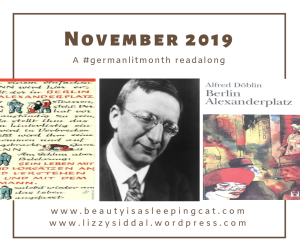
Due to some time constraints this and next week, my post is very short.
Welcome to the #germanlitmonth readalong of Alfred Döblin’s Berlin Alexanderplatz. What enticed you to readalong with us?
When I buy a book in a bookshop, I sometimes keep the receipt. I did so in this case and that’s how I know that the book has been on my shelves for 19 years. I bought it in September 2000. I know that when I bought it, I was extremely keen on reading it. But for some reason I didn’t and because I always felt it was a book that had to be read during autumn – possibly because I visited Berlin in autumn – I postponed it from year to year. When Lizzy mentioned she wanted to read it during this GLM, I decided that the time had finally come.
Summarise your initial expectations. Are they being met?
It’s pretty much how I expected it. Highly readable in some places, and more experimental in others. I struggled more reading the first book than I thought I would. I wasn’t in the right frame of mind, but once I made more time for reading it and saw certain patterns in the storytelling emerge, I was captivated.
Which edition/translation are you using and how is it reading? If you’re reading the original German, is there anything noteworthy about Döblin’s language?
I’m reading the German original and am constantly thinking that it’s almost impossible to translate this adequately because of the extensive use of Berlin vernacular. But since Döblin uses a collage/montage technique there are other challenges. He uses bits from songs, slogans, poetry, and many other sources. Occasionally he uses them verbatim, quite often though, he changes words. Of course, you can translate them, but they won’t mean the same to a foreign reader. With the changes, they might even be more unrecognizable. I was also wondering, if the translators really caught all the allusions and quotes. They would have to be extremely knowledgeable about German culture and literature
The more descriptive passages, especially those in which the narrator/author are present are very beautiful. There’s a rhythm and sound to his sentences that’s unique. The choice of words is very careful.
What are your first impressions of Berlin and Franz Biberkopf?
Because of the way Döblin chose to tell this story, I think of Franz as a guinea pig or a marionette. I feel like I see the threads, the author is using to make him move. I can’t think of him as a real person at all. Interestingly, I feel very differently about Berlin. The city comes across as more of person than Franz. The city comes to life. One has the feeling of experiencing a particular moment in a very particular place.
